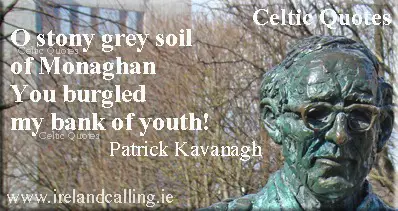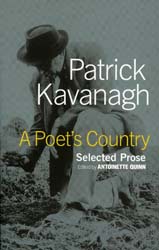In Stony Grey Soil, Patrick Kavanagh vents his bitterness and frustration at how his youth was blighted by the oppressive hardship of rural life in Monaghan in the north of Ireland.
Stony Grey Soil
Kavanagh’s bitterness
Ireland’s 100 favourite poems
Patrick Kavanagh
It’s a poem that immediately sets Kavanagh apart from most of his contemporaries who wrote about nature and the countryside. Many of those writers were educated and city based. To them the life of the peasant had a certain nobility and freedom; not for Kavanagh.
Unlike most middle-class poets, Kavanagh was poor, uneducated and had experienced country life first hand. He spent most of his youth until his late 20s doing hard labour as a farm worker. It was a life of grinding poverty. The battle to find enough to eat provided little chance of achieving any kind spiritual or intellectual fulfilment.

That was the reality of life for Kavanagh and so he was appalled when he read the work of other poets who had no personal experience of country life yet romanticised it as if it were somehow idyllic.
Stony Grey Soil is Kavanagh’s way of setting the record straight, both in relation to his own life and to life in general in rural Ireland in the first half of the 20th century.
Stony Grey Soil – even the title sets a bitter tone
The very title of the poem lets us know straight away that this isn’t going to be a celebration of Monaghan or of rural life.
Stony suggests poor quality and grey suggests dullness – themes that recur throughout the poem.
The opening stanza gets straight to the point with Kavanagh accusing the stony grey soil of stealing the laughter, the love and the passion from his youth. In return it gave him its “clod-conceived”.
This evocative phrase relates to the soil itself, conceived in Monaghan. More importantly though, it may be Kavanagh’s way of referring to himself. Once the love, laughter and passion that he mentions are taken from him, he is reduced to little more than clod of earth himself – dull and lifeless, conceived by the Monaghan soil.
But soil alone can’t drain the life force out of a person? The stony grey soil therefore must be a symbol of the rural life that it sustains. It’s not the Monaghan soil that grinds Kavanagh down; it’s the hard, lifestyle spent working that soil.

Stony Grey Soil
O stony grey soil of Monaghan
The laugh from my love you thieved;
You took the gay child of my passion
And gave me your clod-conceived.
You clogged the feet of my boyhood
And I believed that my stumble
Had the poise and stride of Apollo
And his voice my thick tongued mumble.
You told me the plough was immortal!
O green-life conquering plough!
The mandril stained, your coulter blunted
In the smooth lea-field of my brow.
You sang on steaming dunghills
A song of cowards’ brood,
You perfumed my clothes with weasel itch,
You fed me on swinish food
You flung a ditch on my vision
Of beauty, love and truth.
O stony grey soil of Monaghan
You burgled my bank of youth!
Lost the long hours of pleasure
All the women that love young men.
O can I still stroke the monster’s back
Or write with unpoisoned pen.
His name in these lonely verses
Or mention the dark fields where
The first gay flight of my lyric
Got caught in a peasant’s prayer.
Mullahinsa, Drummeril, Black Shanco-
Wherever I turn I see
In the stony grey soil of Monaghan
Dead loves that were born for me.

Stony Grey Soil
Stony Grey Soil notes and analysis
Stony Grey Soil – Kavanagh’s bitterness
Patrick Kavanagh
